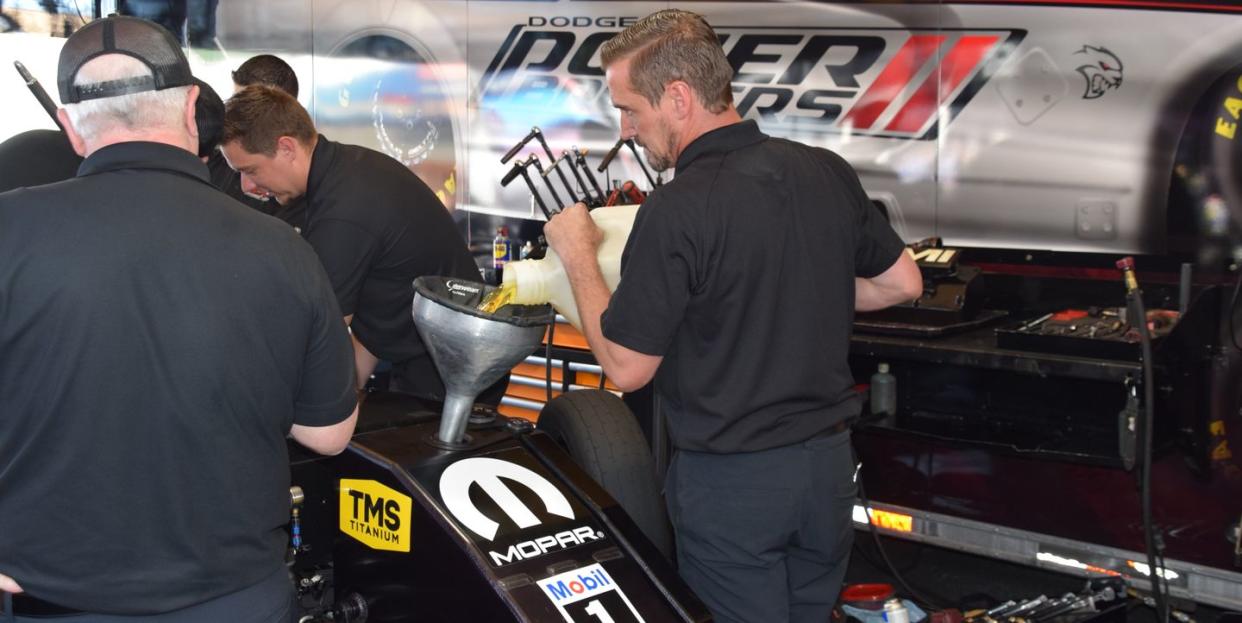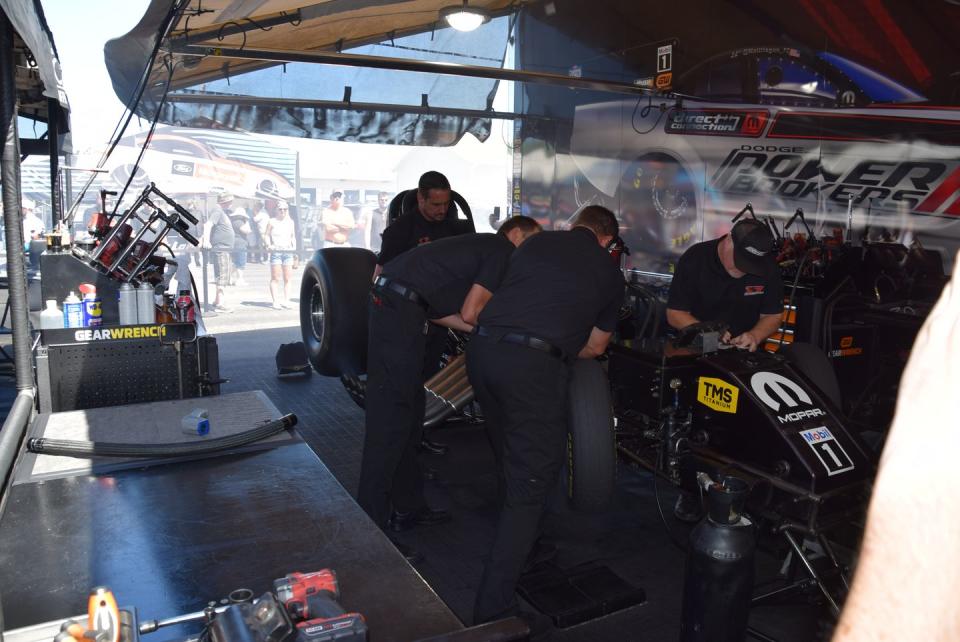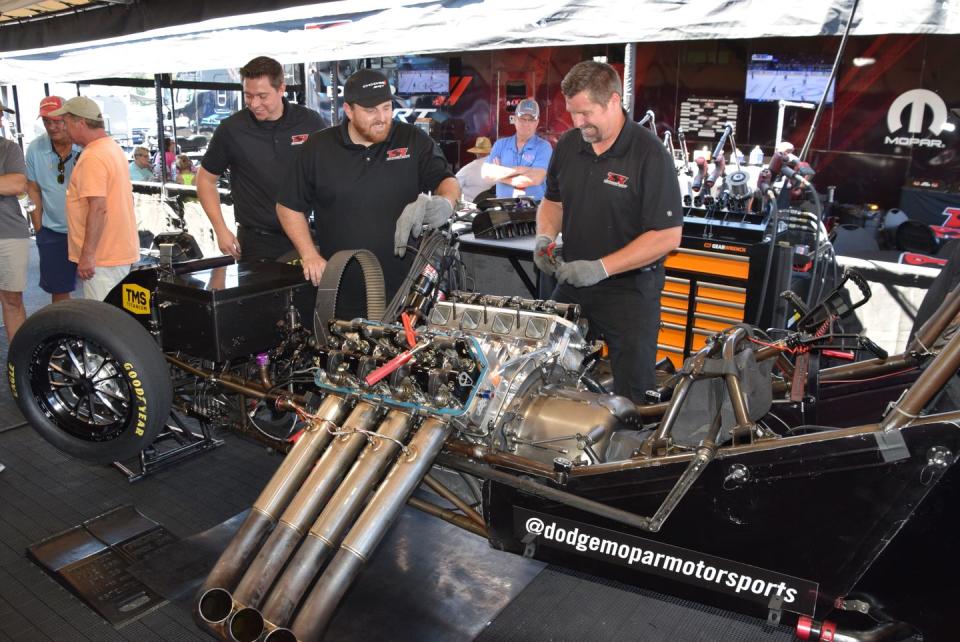Be Glad You’re Not Buying Fuel for an NHRA Car

NHRA teams pay $1800 for a 40-gallon drum of nitromethane, so they’re paying $45 a gallon—and that’s a group discount negotiated for the entire racing season.
Every single run consumes 14 gallons of fuel to run wide-open throttle for 1000 feet, costing about $600 (10% of the fuel is alcohol, which is less expensive).
Factoring in costs for fuel, crew mechanics, parts, and transportation, every single run costs an NHRA team about $5000, champion racer Matt Hagan said.
So you’re already tired of paying $5 a gallon for gasoline and wondering how long your bank account can handle it, and you’re praying to the heavens that we don’t eventually find ourselves shelling out more than $8 a gallon like they do in parts of Europe and Asia.
It could be much, much worse, if you owned a drag racing team that competes each week in National Hot Rod Association Camping World Drag Racing Series events across the country.
Lots of car classes run at these weekend speed-fests, but the funny cars and top-fuel dragsters tend to run the fastest—well over 300 mph on good days—and those are the cars that fill the grandstands with motorsport fans.
At last weekend’s NHRA Summit Equipment Nationals at Norwalk, Ohio, we spent time with the Dodge Power Brokers teams that run Leah Pruett’s dragster and Matt Hagan’s funny car (pictured being fueled, above). Both cars run supercharged Hemi V8s (of course) and produce about 11,000 hp and use fuel consisting of 90% nitromethane and 10% alcohol.

How much does it cost to fuel these pavement pounders?
Let’s put pencil to paper. The teams pay $1800 for a 40-gallon drum of nitromethane, so they’re paying $45 a gallon—and that’s a group discount negotiated for the entire racing season. Every single run consumes 14 gallons of fuel to run wide-open throttle for 1000 feet, or $630 in fuel costs for every single run—actually closer to $600 because 10% of the fuel is alcohol, which is less expensive.
Most teams will run each car several times throughout a weekend of racing, and those lucky enough to reach the finals, of course, get saddled with the additional fuel costs of the extra runs.

But wait, there’s more—a lot more. The engines are punished so severely that each engine gets rebuilt before every run. Each crew has several top-notch mechanics who are paid to do this work under strict time constraints according to NHRA rules, often in sweltering heat.
In addition to paying the staff, the teams also haul 18-wheeler trucks full of fresh pistons, heads, connecting rods, exhaust systems—everything necessary to be in contention for a championship trophy. With drill presses, sanders, and other equipment, these rigs also function as mobile high-tech garages—like MASH units for mechanics, instead of surgeons.

Hagan, a three-time funny car champion and a cattle rancher in Virginia when he isn’t hauling ass, told us every single run costs the team $5000, whether it leads the field, or whether the tires spin and the car gets a bit sideways without even reaching a paltry 100 mph. Each race weekend—at least among funny cars—draws between 15 and 24 teams, Hagan said.
This extreme cost of competition illustrates the importance of deep-pocketed sponsorship from automakers (Hagan's benefactor is Stellantis and its Dodge/MOPAR brands) that desperately need to connect with gearhead fans. And these aren’t just casual fans at NHRA events. They get to walk along pit row and watch the teams rebuild the engines and tweak the cars, then crowd behind the race car to take in the visceral gut punch when a rebuilt engine is started for the first time, bathing in a thick cloud of exhaust and nitromethane vapor blowing into their faces and watering their eyes.
If teams can afford to stage several runs at a cost of $5000 each throughout an entire weekend, the prize money must be huuuuge, like for a pro golfer, right? It can’t just be about a trophy and bragging rights?

Actually, it is. First place for an NHRA funny car earns about $50k, Hagan said, which is more like $15k after seven runs over the course of the weekend. “Just look at how much money it costs to be out here,” Hagan told CompetitionPlus. “At any one race these sponsors are spending from $130,000 to $150,000 and you realize that is (the value of) someone’s home around these parts, so you do take it very seriously.”
Bottom line, racing fuel is pricey, but there are a lot of additional factors that make it expensive to show up for race day. NHRA cars are punished with every single run—along with each team’s finances.

